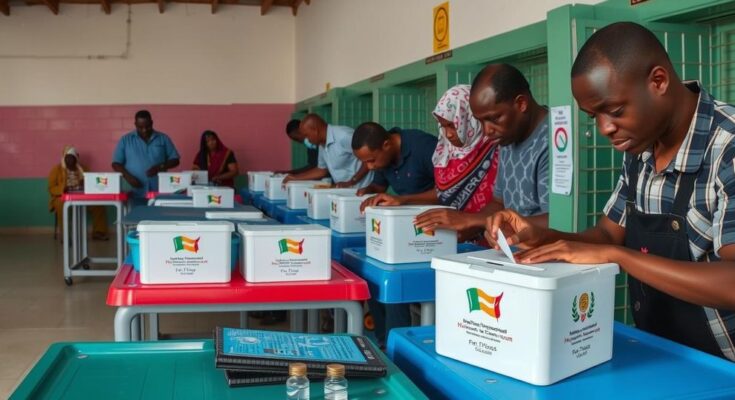Voters in Comoros are participating in elections for a 33-seat parliament amid allegations of irregularities from last year’s presidential poll. Approximately 338,000 voters are registered for these elections, with nearly 100 candidates approved by the Supreme Court. President Assoumani, accused of authoritarianism and potential nepotism, has ruled since a 1999 coup. Some opposition parties have called for a boycott, while others urge participation to expose government flaws. Results are expected by Friday.
Voters in the Comoros Archipelago are participating in parliamentary elections for the 33-seat parliament, following President Azali Assoumani’s controversial re-election last year, which opposition figures claim involved significant irregularities, allegations that the ruling party officials have categorically denied. Polling stations opened early on Sunday, welcoming approximately 338,000 registered voters. This marks the first parliamentary election since January 2020, with nearly 100 candidates approved by the Supreme Court to stand for election. Assoumani has governed Comoros since a coup in 1999 and has won three elections since then. He is currently suspected by opponents of enforcing an authoritarian regime and of preparing his son, Nour El-Fath, for succession when his term concludes in 2029. In 2024, Assoumani conferred considerable new powers to his son, placing him in charge of coordinating government operations. Some opposition factions, particularly the Juwa party led by former President Ahmed Abdallah Sambi, have called for a boycott of the elections, while others have chosen to participate, contending that engagement will expose the government’s deficiencies. As stated by Hamidou Karihila of the Hope of the Comoros party, “The Azali regime is weakened … by participating in these elections we are contributing to further exposing the flaws in its system and accelerating its inevitable fall.” Election results are anticipated by Friday.
The Comoros, an archipelago located in the Indian Ocean, has a history of political instability, highlighted by coups and allegations of electoral misconduct. President Azali Assoumani, who has been in power since assuming control through a coup in 1999, has faced criticism for his governance style, characterized as autocratic by opposition groups. The upcoming parliamentary elections are crucial as they follow a series of contentious electoral processes and allegations concerning the legitimacy of Assoumani’s continued rule. The political environment in Comoros is marked by the struggles between the ruling party and various opposition factions, all of which contribute to the complexities surrounding the elections.
The parliamentary elections in Comoros represent a significant moment in the nation’s political landscape, as voters express their opinions amidst a backdrop of accusations of electoral impropriety. President Assoumani’s long rule and potential succession plans for his son raise critical questions about the future governance structure of the country. The contrasting approaches towards participation in these elections among opposition parties indicate a clear divide within the political landscape, with the outcomes likely to impact the stability and future political climate in Comoros.
Original Source: www.armidaleexpress.com.au




